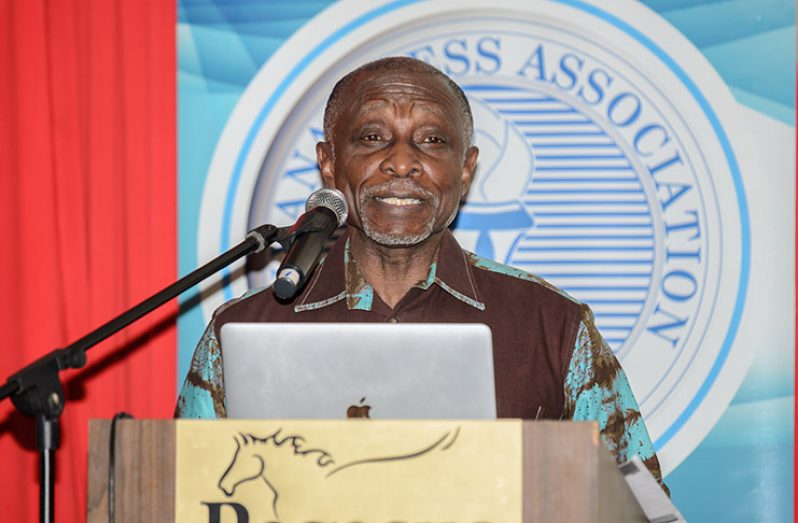– Greenidge tells media practitioners
THE Guyanese media has to be responsible and not ignorant in reports surrounding all aspects of the Arbitral Award of 1899 (Guyana v Venezuela) since the matter is before the International Court of Justice (ICJ).
This is according to Foreign Secretary of the Ministry of Foreign Affairs, Carl Greenidge during his remarks on Saturday evening at the Guyana Press Association’s (GPA) 2019 Media Awards and Dinner where he was guest speaker.
The event was held at the Pegasus Hotel, Kingston Georgetown.
“The stuff that is written in our papers is read by others, including those who represent us at the court and those who fight against us at the court, it matters. So when a newspaper contends that, for example, Guyana signed an agreement with Venezuela saying that we will not utilize the maritime space, which information is completely and utterly false, a Guyana paper carries that, it matters,” the Foreign Secretary said.
He continued: “When we carry materials submitted by Venezuelan entities… the story was the Venezuelan sun rises in the Essequibo, it was in our local papers, we can’t get something like that put in Venezuelan papers, but ours carry it without asking as question.”
Greenidge said that Guyana’s case is to be won and fought not only by the government but the media also has a responsibility.
“It is your space, that we are fighting for along with a set of lawyers, and you have to be responsible, other than ignorant in the material you encourage, utilize, that you publish, it matters greatly,” he told the media gathering.
He explained that government is seeking a binding judgement from the International Court of Justice (ICJ) as opposed to an advisory position.
The former Foreign Affairs Minister explained that Venezuela, though it has refused to partake in the process, will have to abide by the judgement to avoid further action by the United Nations Security Council.
“It is important if that court pronounces in favour of Guyana but even more important would be if the court gives a judgement as opposed to an advisory opinion in favour of Guyana because failure of a party to honour a judgement may bring action by the Security Council,” Greenidge said. “We are not after an advisory opinion; it is a judgement that the court has been called on to make,” Greenidge noted.
The Government of Guyana welcomes the notification by the International Court of Justice that the oral hearing on jurisdiction in its case against Venezuela, formally known as the case concerning the Arbitral Award of 1899 (Guyana v Venezuela), will be held in The Hague from March 23 to 27, 2020.
This hearing will determine whether the Court has jurisdiction over the case filed by Guyana on March 29, 2018.
By that case, Guyana seeks to obtain from the Court a final and binding judgment that the 1899 Arbitral Award, which established the location of the land boundary between then-British Guiana and Venezuela, remains valid and binding, and that Guyana’s Essequibo region belongs to Guyana, and not Venezuela.
Guyana brought its case to the Court following the decision by the Secretary-General of the United Nations, in January 2018, that the controversy between Guyana and Venezuela should be decided by the International Court of Justice.
In taking his decision, the Secretary-General was exercising the power vested in him, in the 1966 Geneva Agreement, among Guyana, Venezuela and the United Kingdom, to decide how the controversy should be settled.
Venezuela has claimed, in a letter to the Court, that the Secretary-General exceeded his authority under the Geneva Agreement, and that the Court therefore lacks jurisdiction to adjudicate Guyana’s lawsuit. On this basis, Venezuela has indicated that it will not participate in the proceedings. On November 19, 2018, Guyana submitted its Memorial to the Court refuting Venezuela’s arguments and demonstrating that the Court has jurisdiction.
Under well-established judicial precedent, the Court will proceed to decide if it has jurisdiction over Guyana’s claims, irrespective of whether or not Venezuela participates in the proceedings.
If it decides that it has jurisdiction, the Court will proceed to rule on the merits of those claims, and decide whether the validity of the 1899 Arbitral Award and the border between the two States should be confirmed.
Under the United Nations Charter and the Court’s own rules, its final judgments both on jurisdiction and the merits will be legally binding on Guyana and Venezuela, whether or not Venezuela participates in the proceedings.
Nevertheless, Guyana expresses the hope that Venezuela will participate, to indicate respect for the Court and the international rule of law, the peaceful settlement of disputes, and the promotion of friendly relations between both States.



.jpg)










